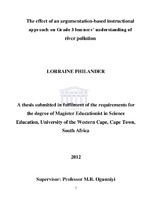The effect of an argumentation-based instructional approach on Grade 3 learners' understanding of river pollution
Abstract
The research reported in this paper involves the use of dialogical argumentation in scientific context with 7-9 year olds as part of teaching and learning in primary classrooms. To develop an understanding of scientific concepts, four suitable collaborative activities on river pollution were used as a stimulus to effectively engage learners in scientific reasoning and use evidence for decision-making through cognitive harmonization. The research, involved four groups of five children each. Data were collected through analysis of children’s Water Pollution Questionnaire (WPQ), classroom observation, documentation of field notes, conversations and focus group interviews. The study found that all groups were able to engage in the activities to some extent, but that good quality argumentation develops when children are familiar with working in this manner. This study sought to investigate the opportunities, possibilities and challenges associated with a dialogical argumentation teaching and learning approach in a primary school science class A mapping technique was used to analyze the children’s discussions and identify the quality of their different “levels” of argument. This study confirmed that an argumentation based instruction was an effective way of enhancing learners’ understanding of river pollution. The learners’ listening skills improved tremendously and they were actively involve during discussions and provided claims with valid grounds or reasons. They were also very enthusiastic and challenged each other’s claims during these argumentation lessons, but most of all was the enjoyment that was visible on their young faces. Further research needs to be carried out over a longer period to determine the effectiveness of an argumentation based instruction.

